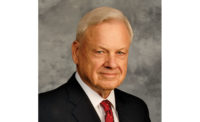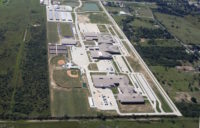In 1976, as Americans celebrated the bicentennial of the nation’s birth, Gene Reed was contemplating the idea of starting something himself—his own construction firm.
He knew it would be a risky venture because it would mean leaving a high-level position with Harvey Construction Co. to face head-on the challenges confronting a small start-up in the building business and the boom-bust extremes of Houston’s energy-based economy.
On the other hand, Reed had chosen construction as a career largely because it appealed to both his technical and business sides. And though he’d been with Harvey Construction for 17 years and enjoyed a great relationship with the family owners, his future advancement there was far from assured.
“If I was ever going to do it,” Reed recalls, “this was the time.”
Reed made his move the following year, and his instincts proved correct. Over the past 40 years, E.E. Reed Construction LP, which gained a reputation for excellence in tilt-up building methods, has grown into a stalwart of the Houston construction industry, shaping the profile of the city and the surrounding area through a variety of commercial, residential and industrial projects.
While tilt-up remains one of E.E. Reed’s specialties, the company’s expertise in cast-in-place and other construction technologies has helped make it a regular participant in high-rise construction jobs. The firm’s portfolio includes Houston’s four Energy Tower office buildings, totaling nearly 1.7 million sq ft; the 13-story, 317,000-sq-ft Three Eldridge Place office building; and a current assignment—the 1.1-million-sq-ft Kirby Collection upscale mixed-use project.
E.E. Reed’s corporate résumé features many less conventional projects as well, including a NASA astronaut training facility that includes a 6.2-million-gallon, zero-gravity simulation tank.
Reed has also diversified his business geographically, although his initial foray beyond metropolitan Houston was driven in large part by the need to offset the sinking economic fortunes that accompanied the 1980s oil bust.
Starting in the familiar in-state markets of Austin and Dallas and teaming up with experienced, expansion-savvy colleagues, Reed eventually found footholds in Southern California and Washington, D.C. Today, the E.E. Reed family of companies boasts more than 300 employees in eight offices, with 2015 billings that topped $546 million.
A Fundamental Philosophy
Reed scoffs at the notion that his story is substantially unique from any other entrepreneur with an idea and the wherewithal to pursue it. While he knew the local market and its players well in those early days, he knew that no one was going to hand a major project to a newly minted upstart.
“I simply used the same business model as Harvey—started with small jobs and as time went on, grew into bigger projects,” he says.
Such modest statements belie Reed’s longtime innate business acumen, says Terry Early, whom Reed hired while at Harvey and who went on to collaborate with Reed on the company’s growth and new market expansion.
“He’s a good business guy as well as a good constructor,” says Early, who, now semi-retired, remains a director at E.E. Reed. “He can look through the forest of details and see the other end—whether this is an opportunity that makes sense or if there’s something no one else has thought of that will make it better.”
Gene’s son, Mark, who worked his way up from field crews to now serve as E.E. Reed’s president, adds that his father’s approach to business always includes consideration of “the other guy’s perspective” when examining an issue—an approach not always embraced by a younger generation of entrepreneurs.
“In the end, he wants to satisfy one question: Is what we’re doing right?” Mark Reed says. “That says a lot about him as a business owner, and as a person.”
As with most other successful contractors, says Early, Gene Reed has also made it a point not only to surround himself with good, smart people, but also to be willing to listen to them.
“He has an acute sense of who he should invest in, often with an ownership stake, and be able to do it wisely,” Early says. “He’s not the type of guy who, if he disagrees with you, will yell and scream or punish you. But he will give you a subtle hint, and you’d better hear it and run with it.”
From the beginning, E.E. Reed has cultivated a rather low-profile internal culture, one that Mark Reed says differs from other contractors that have achieved comparable prominence in the industry.
“We’re not flamboyant, nor will we spend a lot when times are good,” he explains. “We’re austere in the way we run things, but it’s been successful. When people join us, and they understand how we do things, they know that they too will succeed.”
Gene Reed explains that his preference for instilling a sense of ownership in his employees makes them more entrepreneurial, averting the complacency that sometimes sets in when the economy and backlog of work are good.
“Our philosophy benefits people who have learned our way of doing things,” he says. “When they do well and the job makes money, we can reward them more than if they were expecting an automatic raise every year.”
At the same time, Reed embraces an obligation to help his employees do what they can to improve their knowledge and skills, which is one of the many reasons E.E. Reed regularly ranks high in the Houston Chronicle’s annual Top Workplaces list.
Along with keeping employees abreast of the company’s performance and market opportunities, E.E. Reed offers professional development training in such areas as presentations and business etiquette—so-called “soft skills” that Reed says have grown in importance over the years.
“You don’t see ‘good ol’ boy’ deals now,” he says. “People want to know who they’re dealing with.”
The Next Level
With his son now handling most of E.E. Reed’s day-to-day operations, Gene Reed is devoting more of his time to charitable pursuits, further burnishing his nickname, “the father of Fort Bend,” which he received for the many contributions he’s made to the suburban Houston county he’s called home for more than half a century.
His most recent accomplishment—one that he also ranks among his favorites—was spearheading construction of a memorial to the county’s veterans. Appropriately constructed of concrete tilt-up panels, the memorial was designed and built entirely through donations of time, labor and materials from E.E. Reed and other area subcontractors.
“It was a small project, but a lot of energy came together to make it happen,” Reed says proudly.
Another priority for Reed is ensuring that E.E. Reed retains its family-based culture well into the future. Fulfilling that ambition falls largely on Mark, who acquired his father’s love of construction during summer jobs in college, but chose to get his technical education at Texas A&M, somewhat to the chagrin of his University of Texas Longhorn father.
“He’s set the table,” Mark Reed says, “and we want to carry that on by continuing to bring in good people and getting into more complex projects.
Guiding that evolution, he adds, will be the philosophy behind one of his father’s favorite sayings: “Take care of the pennies, and the dollars will take care of themselves.”
In other words, Mark Reed says, “the details matter.”







Post a comment to this article
Report Abusive Comment